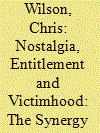|
|
|
Sort Order |
|
|
|
Items / Page
|
|
|
|
|
|
|
| Srl | Item |
| 1 |
ID:
167648


|
|
|
|
|
| Summary/Abstract |
Recent research has introduced the notion of fractal logic as a way of rethinking racialization and ideas and practices of nationhood. We have claimed elsewhere that racial reasoning instantiates a specific fractal logic called the nation in danger, which can be found in circulating images, soundbites, visual signs, metaphors, and narratives created in political communication, news media, and everyday conversations. In these studies, human reasoning is approached as fractals, which implies that the same structure appears self-similarly at different levels. This article examines the nation in danger as a basis for aggressive exclusionary reasoning and practices. Two Danish media events from 2016 are looked at: the segregation of swim classes and the new segregation of schools according to ‘nationality’ and ‘ethnicity.’ By using fractal logic, the nation in danger operates recurrently at different levels and, consequently, constitutes a form of naturalization of the white nationalism that saturates Danish racial reasoning and public debate.
|
|
|
|
|
|
|
|
|
|
|
|
|
|
|
|
| 2 |
ID:
168182


|
|
|
|
|
| Summary/Abstract |
Recent research has introduced the notion of fractal logic as a way of rethinking racialization and ideas and practices of nationhood. We have claimed elsewhere that racial reasoning instantiates a specific fractal logic called the nation in danger, which can be found in circulating images, soundbites, visual signs, metaphors, and narratives created in political communication, news media, and everyday conversations. In these studies, human reasoning is approached as fractals, which implies that the same structure appears self-similarly at different levels. This article examines the nation in danger as a basis for aggressive exclusionary reasoning and practices. Two Danish media events from 2016 are looked at: the segregation of swim classes and the new segregation of schools according to ‘nationality’ and ‘ethnicity.’ By using fractal logic, the nation in danger operates recurrently at different levels and, consequently, constitutes a form of naturalization of the white nationalism that saturates Danish racial reasoning and public debate.
|
|
|
|
|
|
|
|
|
|
|
|
|
|
|
|
| 3 |
ID:
188107


|
|
|
|
|
| Summary/Abstract |
Western countries are experiencing a wave of violent attacks against places of worship, stores, schools and other crowded locations. The perpetrators of these attacks explain their actions as necessary to stem an “invasion” of immigrants which threatens the very existence of the white race. At the same time, many of the same countries have experienced very similar attacks motivated by a particularly contemporary form of misogyny. Known as incels, an abbreviation of involuntary celibate, young men in this community believe they are denied sexual partners by feminism and societal norms of male attractiveness. These two series of attacks are generally understood to be separate (if overlapping) forms of extremism. In this article I contend that the concepts of white genocide central to white nationalism and misogynistic incelism are more intertwined than it appears. Misogyny and the notion of white genocide are mutually escalatory. Rather than separate and complementary forms of extremism, the two ideologies converge to create a single more volatile worldview, one which makes its proponents more prone to the use of violence. Misogyny and white genocide are synergistic, their effect greater than the sum of their parts.
|
|
|
|
|
|
|
|
|
|
|
|
|
|
|
|
| 4 |
ID:
182534


|
|
|
|
|
| Summary/Abstract |
In recent years, hate groups have increasingly attracted public attention while at the same time escaping the purview of scholars. Although overt prejudiced attitudes have lost public support in recent decades, hate group and hate-group activity has remained relatively consistent. What, then, explains the enduring power of hate? I argue that hate groups have arisen in reaction to the loss of social capital, particularly in regard to rural and exurban communities. Using county-level suicide rates as a proxy for the loss of social capital, I test this theory using data from the lower 48 states from 2010 to 2019. I find that each 5.38 percent increase in suicide rates is associated with 1 additional hate group forming. These findings highlight the importance of examining quality-of-life in understanding far-right activity, and challenge previous findings with regard to rurality and hate.
|
|
|
|
|
|
|
|
|
|
|
|
|
|
|
|
| 5 |
ID:
183842


|
|
|
|
|
| Summary/Abstract |
Are Americans aware and concerned about White nationalism in the U.S. Military? Our large and demographically representative survey suggests that while most Americans suspect at least some presence of White nationalism in the military, many do not view it as a serious problem; particularly self-identified conservatives and respondents who hold highly favorable views toward military service members. However, in a between-/within-subjects experiment embedded in our survey, we show that providing information about the issue of White nationalism in the U.S. Military increases the public’s overall concern about White nationalism in the U.S. Military.
|
|
|
|
|
|
|
|
|
|
|
|
|
|
|
|
|
|
|
|
|